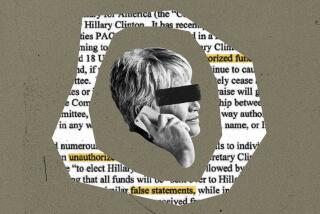Gore Called 38 Donors on White House Phone
- Share via
WASHINGTON — Vice President Al Gore telephoned at least 38 major Democratic donors from the White House to solicit campaign funds during a six-month period in 1995 and 1996, according to a document disclosed Tuesday.
A summary provides the first detailed accounting of Gore’s controversial fund-raising calls from the West Wing of the White House. The appeals apparently resulted in a limited number of large contributions to help pay for a costly Democratic media campaign.
In March, Gore acknowledged that he placed fund-raising calls from his White House office in 1995 and 1996. But the vice president maintained that he and President Clinton--who has said he does not remember whether he made such calls--are exempt from the legal ban on such actions by other federal employees. At a news conference, Gore repeatedly asserted there was “no controlling legal authority” prohibiting him or the president from making such solicitations on federal property.
At the time, Gore said he made fund-raising calls “on a few occasions” from his office in December 1995 and the spring of 1996. The White House subsequently said he made as many as 50 calls, a figure officials confirmed Tuesday.
The list released Tuesday includes 48 calls. But some were repeated efforts to reach one prospective donor, and four were made to thank supporters, including San Francisco real estate magnate Walter Shorenstein, for agreeing to serve as co-chairman of a presidential gala, a White House official said. The list was compiled from Clinton-Gore campaign telephone credit card records.
A White House official familiar with the credit card records said: “I believe there are probably some additional calls that we’ll be able to identify that we can’t tie to a specific billing record.”
The summary document, which was provided to Senate investigators by the Democratic National Committee, shows that Gore made various calls at least nine times between Dec. 1, 1995, and May 2, 1996. Among those he called were Peter Angelos, the owner of the Baltimore Orioles baseball team, and San Francisco philanthropist Ann Getty.
Federal election records show that Getty gave the Democratic Party $50,000 on Dec. 20, 1995, nearly three weeks after Gore called her for a one-minute conversation. Angelos contributed $100,000 on May 24, 1996; Gore and he talked for 4 1/2 minutes on April 26.
“Beginning in the fall of 1995, there was a request by [then-White House Deputy Chief of Staff Harold] Ickes and others that the vice president and the president undertake fund-raising calls to help with the media campaign,” the White House official said. “As best as we can ascertain, the president did not undertake to make these calls, the vice president did.”
In a related development Tuesday, Clinton made his first public comments about four weeks of just-concluded hearings by the Senate Governmental Affairs Committee that focused mainly on fund-raising excesses by the Democratic Party.
One issue probed during the hearings was whether Democratic fund-raiser Yah Lin “Charlie” Trie, a Clinton friend from Arkansas, illegally funneled money from overseas to the Democratic Party. “I had no reason to believe that he didn’t know what the law was and wouldn’t follow it,” Clinton said in an interview published in USA Today.
He said the Democratic Party’s acceptance of suspect funds “happened because the DNC simply was not minding the store” and that Democrats have “paid a dear price” for that failure to effectively screen donations.
In addition, it was disclosed that then-Democratic National Committee Co-Chairman Donald L. Fowler sent Atty. General Janet Reno and other Cabinet secretaries a year-end 1995 report about the party’s election activities, including its goal to raise more than $100 million in 1996.
“The next year will require the full dedication and cooperation of all of us,” Fowler said in the two-page correspondence on New Year’s Eve.
Judicial Watch, a conservative group, obtained a copy of the memo in a lawsuit against the Justice Department. Its chairman, Larry Klayman, called the communication “improper.”
Bert Brandenburg, Reno’s spokesman, said the attorney general has “no recollection” of the letter. “I don’t think she saw it,” he said, referring to it as “Cabinet junk mail.”
Times staff writer Ronald J. Ostrow in Washington and researcher Janet Lundblad in Los Angeles contributed to this story.
More to Read
Get the L.A. Times Politics newsletter
Deeply reported insights into legislation, politics and policy from Sacramento, Washington and beyond. In your inbox twice per week.
You may occasionally receive promotional content from the Los Angeles Times.










